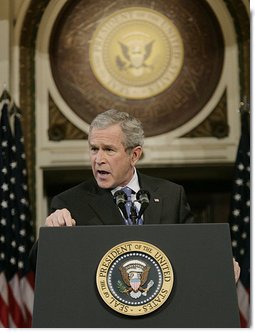Secretary of Defense Donald Rumsfeld, meeting with troops in Qatar, 28 April 2003:
And there have not been large numbers of civilian casualties
because the coalition took such great care to protect the lives of
innocent civilians as well as holy sites. … When the dust is
settled in Iraq, military historians will study this war. They’ll
examine the unprecedented combination of power, precision, speed,
flexibility and, I would add also, compassion that was employed.
General Tommy Franks, Bagram Air Force Base, 19 March 2002:
I don’t believe you have heard me or anyone else in our leadership
talk about the presence of 1,000 bodies out there, or in fact how
many have been recovered. You know we don’t do body counts.
Donald Rumsfeld, interview on FOX News Sunday, 9 November 2003:
Well, we don’t do body counts on other people ….
Gilbert Burnham, Shannon Doocy, Elizabeth Dzeng, Riyadh Lafta, and Les Roberts (principal authors): The Human Cost of the War in Iraq: A Mortality Study, 2002–2006:
A new household survey of Iraq has found that approximately 600,000 people have been killed
in the violence of the war that began with the U.S. invasion in March 2003.
The survey was conducted by an American and Iraqi team of public health researchers. Data
were collected by Iraqi medical doctors with analysis conducted by faculty of the Johns
Hopkins School of Public Health. The results will be published in the British medical journal,
The Lancet.
The survey is the only population-based assessment of fatalities in Iraq during the war. The
method, a survey of more than 1800 households randomly selected in clusters that represent
Iraq's population, is a standard tool of epidemiology and is used by the U.S. Government and
many other agencies.
The survey also reflects growing sectarian violence, a steep rise in deaths by gunshots, and
very high mortality among young men. An additional 53,000 deaths due to non-violent causes
were estimated to have occurred above the pre-invasion mortality rate, most of them in
recent months, suggesting a worsening of health status and access to health care.
Methods: Between May and July 2006 a national cluster survey was conducted in Iraq
to assess deaths occurring during the period from January 1, 2002, through the time of
survey in 2006. Information on deaths from 1,849 households containing 12,801 persons was
collected. This survey followed a similar but smaller survey conducted in Iraq in 2004. Both
surveys used standard methods for estimating deaths in conflict situations, using
population-based methods.
Key Findings: Death rates were 5.5/1000/year pre-invasion, and overall, 13.2/1000/year
for the 40 months post-invasion. We estimate that through July 2006, there have been
654,965 excess deaths
–fatalities above the pre-invasion death rate–in Iraq as a
consequence of the war. Of post-invasion deaths, 601,027 were due to violent causes.
Non-violent deaths rose above the pre-invasion level only in 2006. Since March 2003, an
additional 2.5% of Iraq's population have died above what would have occurred without
conflict.
The proportion of deaths ascribed to coalition forces has diminished in 2006, though the
actual numbers have increased each year. Gunfire remains the most common reason for
death, though deaths from car bombing have increased from 2005. Those killed are
predominantly males aged 15-44 years.
…
Deaths were recorded only if the person dying had lived in the household continuously for
three months before the event. In cases of death, additional questions were asked in order to
establish the cause and circumstances of deaths (while considering family sensitivities). At
the conclusion of the interview in a household where a death was reported, the interviewers
were to ask for a copy of the death certificate. In 92% of instances when this was asked, a
death certificate was present.
White House Press Conference, 11 October 2006:
Q Thank you, Mr. President. Back on Iraq. A group of American and Iraqi health officials
today released a report saying that 655,000 Iraqis have died since the Iraq war. That figure is
20 times the figure that you cited in December, at 30,000. Do you care to amend or update
your figure, and do you consider this a credible report?
George Bush: No, I don’t consider it a credible report. Neither does General Casey and
neither do Iraqi officials. I do know that a lot of innocent people have died, and that troubles
me and it grieves me. And I applaud the Iraqis for their courage in the face of violence. I am
amazed that this is a society which so wants to be free that they’re willing to — that there’s a
level of violence that they tolerate. And it’s now time for the Iraqi government to work hard to
bring security in neighborhoods so people can feel at peace.
No question, it’s violent, but this report is one — they put it out before, it was pretty well — the
methodology was pretty well discredited. But I talk to people like General Casey and, of
course, the Iraqi government put out a statement talking about the report.
Q — the 30,000, Mr. President? Do you stand by your figure, 30,000?
Bush: You know, I stand by the figure. A lot of innocent people have lost their life —
600,000, or whatever they guessed at, is just — it’s not credible. Thank you.
Harry Frankfurt, On Bullshit (1986/2005):
One of the most salient features of our culture is that there is so much bullshit. …The realms
of advertising and of public relations, and the nowadays closely related realm of
politics, are replete with instances of bullshit so unmitigated that they can serve among the
most indisputable and classic paradigms of the concept.
Further reading:
